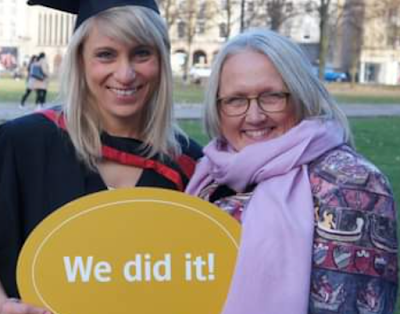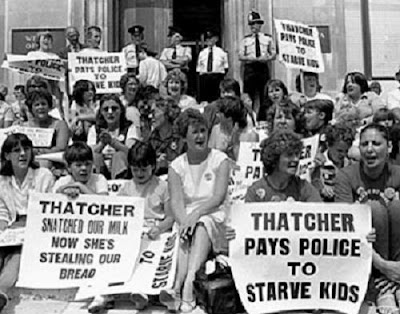10:30 Lois disappears into the dining-room to take part in the first of her sect's 2 worship services today on zoom. But she wants to take part in the second one at friend and fellow-sect-member Mari-Ann's house - and as her back is giving her trouble she wants me to drive her there and pick her up afterwards.
Mari-Ann (right), Lois's friend and fellow-sect member
Timing will be tight - yikes! The first service ends about 11:45 am: then we have to have lunch and, after that, I have to get her to Mari-Ann's by 12:30 pm - yikes! That's why, while she's doing her zoom I have to get the lunch ready on plates with glass of water each and a cup of tea each, ready for when she appears at 11:45. What madness!
12:10 After a hurried lunch I drive Lois over to Mari-Ann's. I have a choice of 3 routes - decisions, decisions haha!
three of the many possible routes I could take to get us to
Mari-Ann's house: I choose the longest one (4.5 miles),
because it's the least annoying. Makes sense to me haha!!!
14:00 While Lois is over at Mari-Ann's I relax with a cup of TeaPig extra-strong Earl Grey tea and one of Lois's so-called "raspberry delights", a crunchy finger of something that tastes "oaty and moist", which is how I like it. Call me crazy if you like!
I take a look at my smartphone and the quora forum website. I'm pleased to see that one of my favourite pundits, James M. Volo (crazy name, crazy guy!), has been weighing in on the vexed subject of "In medieval wars, how much time was spent travelling to the battle, compared to the battle itself?".
I'm glad to see Volo's contribution to this debate today, because I think the subject of "commuting time" to and from medieval battles is a topic that deserves more attention than it has received heretofore.
In a thoughtful response to this question, James writes, "Weeks or months might be spent [in order] to marshal an army, organize
it into manageable units, transport it to the general area of the war, manoeuver
for advantage, and deploy — for only a few hours of battle. Medieval combat,
whether mounted or [on] foot, was bloody, exhausting, and 'up close' [and personal]."
Remember that medieval battles were fought at a time centuries before the development of the Lear Jet, or helicopters, or similar quick and convenient modes of transport for fighting men.
It's well-known that the last Anglo-Saxon king, Harold Godwinson, lost the crucial Battle of Hastings in 1066 against William the Conqueror's Normans, a defeat which set England back a few centuries in terms of the development of democratic institutions and a fair judicial system.
Harold Godwinson, King of the Anglo-Saxons, is said to
have started the Battle of Hastings feeling bad-tempered
after a "punishing" commute from Yorkshire.
Harold had a huge, 257-mile commute to complete before taking part in the battle, which probably made him and his men rather bad-tempered and perhaps longing for a drink of some sort. And remember that this journey also came on top of another battle, the Battle of Stamford Bridge against his brother and the invading Norwegians.
The army also had to keep itself fed on the long march south from Yorkshire. I noticed when I saw the film "Bananas" (1971) that the rebel army in the South American republic of San Marcos, on their march to capture the capital and stage a coup, were able to just stop off at a McDonald's and put in an order for 1000 grilled cheese sandwiches to go, plus tuna and BLT's. Not so easy in Harold's time - fast food hadn't been invented, so you had to get a table and wait for the waiter and the kitchen staff to respond: and the queue would have been right out onto the street, no doubt about that! Can you imagine it???!!!
What a crazy world they lived in in those days!
Poor battle-scheduling was undoubtedly a factor also. I've often thought that if the Normans had arrived a few days earlier, then Harold and his men would have been feeling fairly fresh after the relatively short commute from London. The Anglo-Saxons could have easily defeated William the Conqueror and his Normans, before then completing the opposite commute northwards up to Stamford Bridge.
And after that, even if Harold had been bad-tempered and ill-at-ease at Stamford Bridge and so suffered defeat at the hands of his brother and the Norwegians, it wouldn't have mattered so much for English history, as the Norwegians had the same system as the Anglo-Saxons. Any changes that the victorious Norwegians might have brought in might have been fairly trivial and "transparent".
Damn! What an awful pity!!!! Still, it's a bit too late to do anything about it now, that's for sure !!!!!
the Battle of Stamford Bridge - the result of "poor scheduling"
15:00 Lois rings me to say she's ready to come home, so I drive over to Alma Road to pick her up.
21:00 We haven't seen any Channel 5 royal documentaries for a while, so we decide to watch the first half of "Princess Alexandra: the Queen's Confidant".
Lois and I have got vague memories of Princess Alexandra, the Queen's cousin from our childhood in the 1950's, but I think that after Alexandra's high-profile marriage to businessman Angus Ogilvy had taken place, in 1963, she more or less dropped out of the headlines, because in the 1960's the press were taking a far bigger interest in Princess Margaret, Prince Charles and Princess Anne etc.
(left to right) King George VI, Alexandra and Princess Elizabeth,
the future queen; there was a 10-year age gap between the two girls
but they have remained close friends up to the present day
Princess Alexandra (right) with the Queen,
the Duke of Edinburgh and Prince Charles
I don't think she minded dropping out of the headlines, because she seems to have been a quiet soul, even though she was a bit of a tomboy in her younger years.
Princess Alexandra, the "tomboy princess"
Lois and I didn't realise that Alexandra's family were relatively poor after her father the Duke of Kent was killed in a plane crash in the early 1940's. There was no provision at that time from the royal purse for royal widows. What madness!
So Alexandra became the first royal to be educated at a school, rather than by a nanny. It's nostalgic for Lois and me to see pictures of girls at Alexandra's school at Ascot queueing up to get their free mid-morning bottle of milk, just like Lois and I used to do, all through our schooldays up to age 18.
girls at Alexandra's school queueing up for their mid-morning bottle of milk
What remained of he free school milk scheme was finally stopped by the then Education Secretary, Margaret Thatcher, in 1971, a move which earned her the nickname "Thatcher the Milk-Snatcher".
an anti-Margaret Thatcher demonstration from the 1980's
What a crazy world they lived in in those days!! [Let me remind you you're only allowed to say that up to five times in each post - and I'm counting! - Ed]
I remember that at school I used to take as long as possible to drink my milk during the mid-morning break, so as to minimise the time left for "playing" - an activity that didn't interest me too much.
What a crazy little guy I was !!!! [Just watch it, that's all, you're getting near the limit now! - Ed]
22:00 We go to bed - zzzzzzzzzzzz!!!!














No comments:
Post a Comment